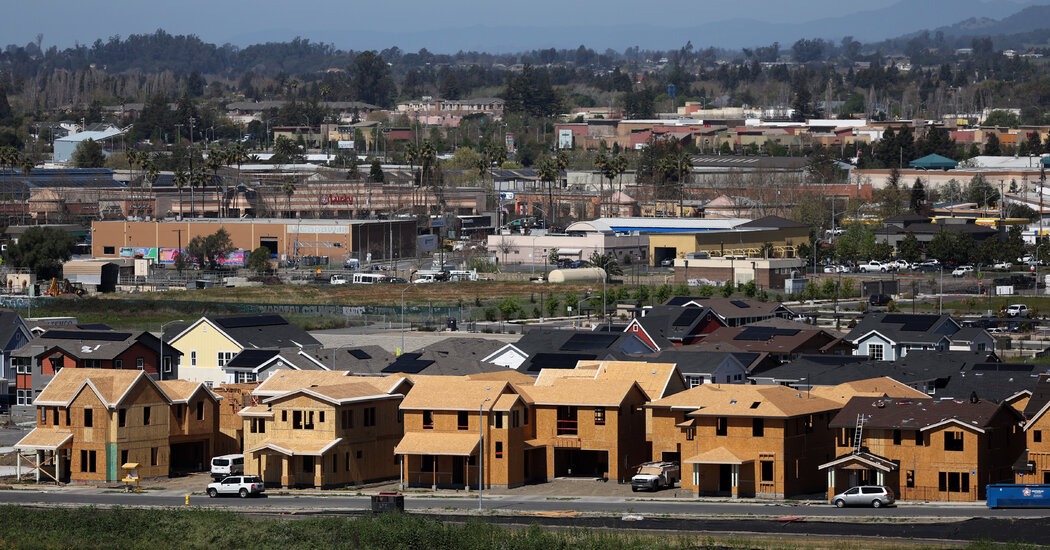
HOUSTON — Gov. Greg Abbott of Texas said on Wednesday that days of snarled traffic on the border, caused by new safety inspections he ordered last week, were part of a concerted effort to force Mexican officials to do more to stop the flow of migrants into the United States.
Ratcheting up the stakes in a clash over immigration that has tangled trade routes into Texas, Mr. Abbott said he would end the inspections only at one entry point — the bridge between Laredo and the Mexican city of Colombia, Nuevo León — and only because the governor of that state had agreed to increase border security on the Mexican side.
The Texas police, Mr. Abbott said, would continue to stop all trucks coming from other Mexican states for safety inspections, despite increasing pressure from truckers, business groups and officials from both parties who are calling for an end to the delays that have stretched for hours and even days and sharply limited commercial traffic.
“Clogged bridges can end only through the type of collaboration that we are demonstrating today between Texas and Nuevo León,” said Mr. Abbott, a two-term Republican up for re-election this year.
The announcement marked a shift in Mr. Abbott’s public description of the safety inspections he ordered last week, an acknowledgment that they were a means to exert political pressure, both on Mexican officials and on President Biden.
“The goal all along has been to ensure that people understood the consequences of an open border and that Texas isn’t going to tolerate it anymore,” Mr. Abbott said.
In a statement on Wednesday, Jen Psaki, the White House press secretary, called the inspections “unnecessary and redundant” and said that “the continuous flow of legitimate trade and travel and C.B.P.’s ability to do its job should not be obstructed,” referring to blockages at Customs and Border Protection facilities. State police in Texas have established their vehicle safety checkpoints just beyond where trucks pass through federal inspection, creating the backups. Ms. Psaki said commercial traffic had declined by as much as 60 percent.
The Mexican Foreign Ministry, in a statement, said that it opposed Mr. Abbott’s actions and that Mexican officials had been in touch with Mr. Abbott and with federal officials to “find alternatives that ensure the security of our shared border without harming binational trade.”
The safety checks have applied to all commercial vehicles entering Texas at major commercial crossings, and in the days since they commenced, backups at the border have grown substantially.
Businesses complain that they cannot get goods into Texas. Mexican truckers, facing daylong delays in sweltering heat without food or bathrooms, began to protest, and created blockades at crossings in the cities of Pharr and El Paso late Monday into Tuesday.
Even some Republican politicians, like the conservative agriculture commissioner, Sid Miller, urged Mr. Abbott to end the inspections, saying they were “increasing the cost of food and adding to supply chain shortages.”
And so on Wednesday, Mr. Abbott appeared in the border city of Laredo with the governor of the Mexican state of Nuevo León, Samuel Alejandro García Sepúlveda, and said that Texas would end the safety checks for trucks coming into Laredo, a crossing that serves a relatively limited area of the border. “The Texas Department of Public Safety can return to its previous policy” of random checks at that crossing, Mr. Abbott said.
Mr. García said that, in exchange, officials in his state had set up some checkpoints on the Mexican side of the crossing and promised that “our 14 kilometers of border with Texas will be continually patrolled with our police.” (The border between Texas and Mexico is 1,254 miles, or more than 2,000 kilometers.)
Mr. Abbott presented the decision as a victory, suggesting he had been able to reach an agreement with Mexican leaders in one state on border security, and promised to do so with others at well.
But that aim was never mentioned in Mr. Abbott’s rollout of the inspections last week. Instead, he had said the inspections were part of a broad response to the Biden administration’s announcement that it would be ending a Trump-era policy of turning back most migrants at the border under an emergency public health rule, known as Title 42.
Mr. Abbott on Wednesday urged Mr. Biden to maintain the public health policy, which is expected to end next month.
Another part of Mr. Abbott’s effort to pressure the Biden administration, also announced last week, has been to charter buses to take migrants released from federal custody into Texas and bring them to Washington or other locations outside of the state. The migrants went on a voluntary basis, state officials said.
On Wednesday, the first of the buses arrived in Washington, Mr. Abbott said in a statement, carrying two dozen migrants from Colombia, Cuba, Venezuela and Nicaragua. A second was on the way.
A camera crew from Fox News was on hand for the arrival of the first bus and captured images of the migrants as they exited near the Capitol, wearing masks and gripping manila envelopes.
Mr. Abbott and his political strategists have seen the border, and opposition to the Biden administration’s immigration policies, as a winning issue with voters, including many Democrats in Texas.
But the backups caused by the inspections, which industry experts said affected tens of millions of dollars in produce deliveries alone, provided a rare opening for Democrats to use the border against Mr. Abbott.
“It’s the wrong response to the problem of Title 42,” said Representative Henry Cuellar, a Democrat whose district includes Laredo. “All he’s done is delay the national supply chain. He’s affecting a lot of incomes here. The cost, it’s going to be passed on from the companies to the consumer.”
Edgar Sandoval and Niraj Chokshi contributed reporting.




